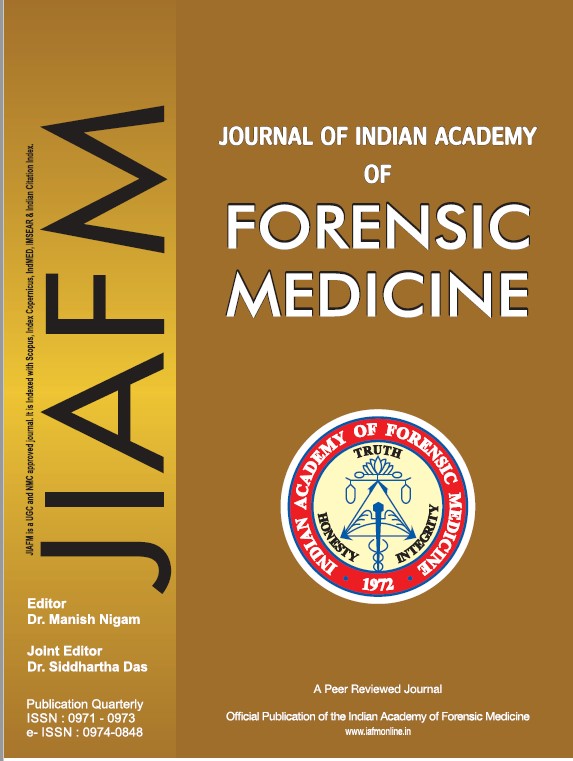Cephalometry Compliments Dactylography
DOI:
https://doi.org/10.48165/Keywords:
Forensic identification, Anthropometry, Cephalometry, DactylographyAbstract
Forensic identification either strives to achieve or claim‘s to achieve conclusions of ‗individualization‘. Acceptable methods include Anthropometry, Dactylography, DNA analysis, Forensic Odontology. Among which Fingerprints is a well- known field used widely for personal identification and preferred in data bases and Cephalic index in distinguishing Sex, ethnicity, geographical identification, and Forensic reconstructions. As both Finger prints and Head shapes develop genetically, as unique characteristics of individuals, we intended to study the relation between these two methods of individualization. Finger prints and cephalic index of 100 volunteering students, in the age group of 19-23 yrs were recorded and categorized. The data was subjected to statistical analysis and it was found that, the mean cephalic index among all participants was mesocephalic predominant while the females were predominantly Brachiocephalic. The finger print pattern revealed a predominance of Loop (72%), followed by whorl and arch as a whole, where the Loop pattern predominated in the Mesocephalics, and the whorl in Brachiocephalics. Of interest was the presence of the Arch pattern, seen only in brachiocephalic female. The findings of our study does point to a correlation between Finger print patterns and Cephalic indices of the individuals.
Downloads
References
Francis Galton, F.R.S. FINGER PRINTS: London, Macmillan and Co. 1892: 146-54.
Kasai K, Richards LC, Brown T.A Comparative Study of Craniofacial Morphology in Japanese and Australian Aboriginal Populations. Hum Bio. 1993;68:821-34
Cummins, Midlo. The Topographic History Of The Volar Pads (Walking Pads) In The Human Embryo”. Embryol. Carnig. Int. Wash, 1929; 20:103-109.
John J., Mulvihill, David W. Smith. The Genesis of Dermatoglyphics. J Pediatrics. 1969;75(4 ):579-89
U.G. Esomonu, M.I. Badamasi. Cephalic Anthropometry of Ndi Igbo of Abia State of Nigeria, Asian Journal of Scientific Research. 2012;5(3):178-84
Soames, R.W. Skeletal System. In: Grays Anatomy, Williams, P.L., L.H. Bannister, M. M. Berry, P. Collins, M. Dyson, J.E. Dussek and M.W.J. Ferguesson (Eds.). 1995; 38th Ed., Churchil Livingstone, New York, P: 425-736.
Yogesh N. Umraniya Y, Hetal H Modi, Himanshu K Prajapati. Sexual Dimorphism in Dermatoglyphic Pattern Study. International Journal Of Medical And Public Health Science Research (IJMPHSR),2013;1(2),: 1-6
Lin Hong, Anil Jain. Classification Of Fingerprint Images, Department of Computer Science, Michigan State University, East Lansing, Mi 48824.
NamdeoPrabhu, RakhiIssrani, SaurabhMathur, Gaurav Mishra, ShrutiSinha. Dermatoglyphics in Health and Diseases. J Res Adv. Dent 2014; 3:2:20-26.
Bhargava I, Kher GA. A comparative anthropometric study of Bhils and Berelas of Central India. J Anat Soc India, 10: 26-33(1961) 11. Sapna Shah, S.P. Rathod, S.V. Patel, T. C. Singh, S. M. Patel,
ParthPandya. The Study of Cephalic index in living subjects in Gujarat region. NJIRM 2012; 3(4): 54-56.
Mahesh Kumar, Patnaik V.V. Gopichand. The Study of Cephalic Index in Haryanvi Population, Int. J. Pure App. Biosci.2013;1(3):1-6 13. IlaJitheshGujaria, Vishal Manoharrao Salve. Comparison of Cephalic Index of Three States Of India, Int. J Pharm Bio Sci. 2012;3(4): 1022-31
VaishaliKiranYagain, Shakunthala R. Pai, Sneha G. Kalthur, Chethan P, I Hemalatha.Study of Cephalic Index in Indian Students. Int. J. Morphol. 2012; 30(1):125-29.
Rajesh Bardale. Principles of Forensic Medicine and Toxicology. P74-75, First Edition 2011, Jaypee publications.
Dhall U, RatheeSK, Sharma BD.Utility of Fingerprints in Myocardial Infarction Patients. J Anat. Soc. India. 2000; 49(2): 153- 54.
Lakshmi V. Dermatoglyphics and Orthodontics- A Review, Annals and Essences of Dentistry. 2013;5(4):30-33


